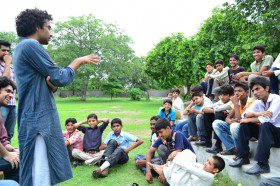The Harvard University South Asia Institute awards the Grant for Entrepreneurship in South Asia (GESA) to students who wish to pursue projects that provide entrepreneurial solutions to social and economic problems in South Asia. Proposals considered for funding include those that immerse students in the problems of South Asia and present innovative entrepreneurial attempts towards its solutions. Projects may take the form of a business plan, a plan to build a non-profit, or a plan to create a regulatory intervention. Each must solves a crisply stated significant problem in a particular setting in South Asia.
2013 Award Recipients:
A Mobile Voice Alert System Connecting Employers to Job-Seekers in Post Conflict Sri Lanka
Casimira Karunaratne, Harvard College
Inesha Premaratne, Harvard College
Ishani Premaratne, Harvard College
The Problem
In the aftermath of a 25+ year civil war that left behind more than 90,000 war widows, the region suffers from high unemployment rates due primarily to an information gap that exists between job seekers and employers. This means that employers have no capability to advertise job opportunities to the villagers who would be willing to work for the salary they offer, and thus, hundreds of jobs go unfilled in recently opened factories (as seen in May 2012 in the case of a newly opened MAS Holdings factory). It is unacceptable that so many jobs should go unfilled when so many are in need of work to support their families.
The Solution
In order to reduce high unemployment rates in northern Sri Lanka, GrowLanka is developing a mobile job alert system that will give employers a direct line of access to job seekers. While many must travel to the center of their respective towns in order to gain internet access, more than 87% of the population has a mobile phone. Indeed, with the country’s 98% signal coverage, Sri Lanka’s mobile penetration rate stands at a level higher than the world and regional averages. Our mobile innovation aims to capitalize on this rich cellular network and reach citizens where they already are. This system is innovative in that it will use voice technology developed by awwaz.de (an India-based company that focuses on mobile and voice based solutions in community settings, founded by Neil Patel of Stanford University and Tapan Parikh of UC Berkeley). Job seekers will receive weekly recorded job notices for employment opportunities that match their profile (sector experience, area of expertise and interest, etc.) and location.
We intend to pilot the system outlined by providing free access to this system to 350 villagers in three villages in Vavuniya in partnership with our field partner, Sewalanka (the ‘treatment group’). These villages will be chosen randomly from a list of villages in which our field partner currently operates in the area. The pilot will aim to establish a working prototype of the system to ensure that the technological solution we are proposing is appropriate for this environment. In particular we hope to establish that the villagers can quickly develop the knowhow needed to use the system and search for employment opportunities, and that employers are able to effectively route information to job seekers.
Immediate Goals and Objectives
To bridge a pervasive information gap by delivering vital job information to the most impoverished segment of the population in northern Sri Lanka, thus increasing their income, quality of life, and ability to contribute to the development of the post-conflict region in which they live.
Long Term Goals and Objectives
Expansion of GrowLanka’s coverage to other towns and villages in Sri Lanka. With a reduction in unemployment and families’ investment in their children’s education, we will contribute to growth in this region and the bolstering of the Sri Lankan economy.
 iSpace for Women
iSpace for Women
India’s first women-only technology space
Saurabh Agarwal, MPA Candidate, Harvard Kennedy School
Prem Ramaswami, MBA Candidate, Harvard Business School
iSpace for Women seeks to empower women by providing a technology enabled safe environment along with education support. The proposal involves setting up a center with cyber café facilities for women and gradually moving up the value chain to an incubation center.
The Problem:
Cyber cafes are not frequented by women due to safety and cleanliness issues, specifically involving the usage of cyber cafes by men to view pornography. There is also a need to provide more internet access to women who are often intimated by their male counters parts or do not find a conducive environment to learn.
The Solution:
The target audience for our female friendly cyber cafes will be young college age women, young female professionals, and new mothers in tier 1, 2, and 3 cities. We will choose women since current cyber cafes appear to be unsafe environments for women to access online information. In addition, in experiments with Grameen Bank and microfinance, it has been shown that empowering women results in the empowerment of entire families.
The iSpace cybercafés will provide internet access, printing; coffee, regular educational seminars, and training events. Using the funds from the Omidyar Grant for Entrepreneurship in South Asia, iSpace will create a pilot cybercafé in Chennai, and hope to grow this into numerous cybercafé chains.
From learning to dreaming in Pakistan
Saniya Ansar, Harvard Kennedy School
Asad Husain, Harvard Business School
Nora Elsheikh, Harvard Graduate School of Education
Haider Raza, Harvard Kennedy School
Imran Sarwar, Harvard Kennedy School
Rabtt is an initiative that aims to enhance the public education system in Pakistan through engaging public school students in short-term education camps and year-round workshops. This project aims to assist the organization transition from its pilot phase and step towards its new 5 year growth plan. Curriculum reform and new engagement models will be tested during the summer camps, from June-Aug 2013, which will take place in Lahore, Pakistan.
The Problem:
The public education system in Pakistan is mired with multiple problems, not the least of which is the quality of education, curriculum, and pedagogy. With students classically conditioned to memorize and regurgitate textbook material, exam patterns and teaching methodologies only work to reinforce these habits. Coupled with a narrow curriculum that robs students of independent thought and critical thinking skills, students develop tunnel-vision in terms of the way they perceive the world and their community. Influenced by a healthy dose of militaristic and religious undertones in almost every subject, students are becoming mere ideologues.
The Solution:
Rabtt, which literally translates to ‘connection’, is an attempt to connect with public school students at a personal level and foster the desire to think critically. Rabtt aims to:
- Promote independent and critical thinking in students by engaging them with subject material that promotes content understanding versus rote memorization
- Facilitate the personal growth of students with an emphasis on creativity and confidence building
- Develop, in students, tolerance for diversity and differing world views.
These specific aims give rise to the organization’s mission statement, to promote independent and critical thinking through educational camps, bringing together students and mentors from different classes of society in an environment conducive to learning about new fields of knowledge and broadening the scope of future possibilities in an effort to fulfill Rabtt’s vision of a generation of students and young professionals capable of critically analyzing the possibilities and opportunities present at their disposal and making informed decisions.
Read more about the Omidyar Grant for Entrepreneurship in South Asia.


